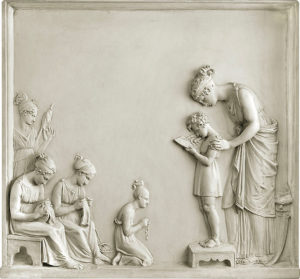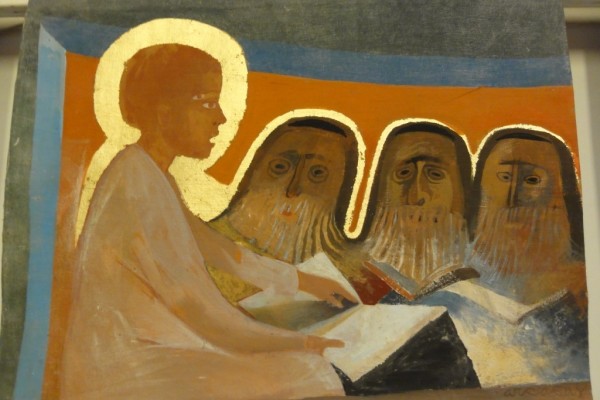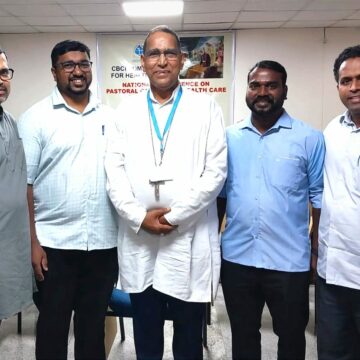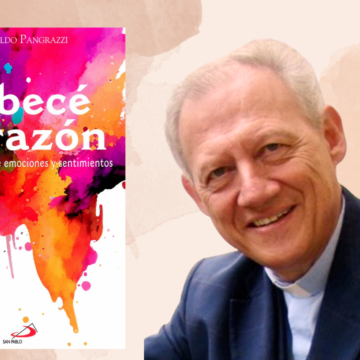 I would like to begin my comments on this second ‘work of spiritual mercy’ with a fine thought of St. Rabano Mauro, the Benedictine Abbot of Fulda and a great Archbishop of Magonza: ‘Those who lead back the errant to the way of truth give alms; those who instruct the ignorant give alms; those who proclaim the Word of God to their neighbours give alms’. Here in extreme synthesis is the essential and profound objective of those who want to perform this demanding act of charity.
I would like to begin my comments on this second ‘work of spiritual mercy’ with a fine thought of St. Rabano Mauro, the Benedictine Abbot of Fulda and a great Archbishop of Magonza: ‘Those who lead back the errant to the way of truth give alms; those who instruct the ignorant give alms; those who proclaim the Word of God to their neighbours give alms’. Here in extreme synthesis is the essential and profound objective of those who want to perform this demanding act of charity.
One can discern three categories of the ignorant as encountered when reading the Gospel. The first are those who do not know that they do not know. The example that stands out is the Apostle Simon Peter, a lively character, an impulsive man who was always ready to express his views. He was capable of saying to Jesus ‘You are the Christ, the Son of the living God’ (Mt 16:16) because he had been touched by a revelation that he had received, ‘neither from flesh nor blood but from the Father who is in heaven’, but then he was absolutely incapable a second later of understanding what Jesus said to him when Christ announced his passion and death on the cross. Simon Peter, the Prince of the Apostles, showed that he was a man ready to acknowledge the divine identity of Jesus but a moment later he was completely in error. Thus it was that when Jesus began to say to his disciples that he had to go to Jerusalem and suffer greatly at the hands of the elders, the high priests, and the scribes, and would be killed and rise again on the third day, Simon Peter took him to one side and began to protest, saying: ‘God forbid, Lord, this shall never happen to you’. But Jesus turned and said to Peter: ‘Get behind me, Satan, you are a hindrance to me; for you are not on the side of God, but of men’ (Mt. 16:21-23).
The second category is made up of those who know that they do not know, are engaged in a search, and ask themselves questions. Amongst the contemporaries of Jesus we find Nicodemus, a wise Jew, a doctor of the law, a teacher in Israel who knew Holy Scripture perfectly and taught it. However, his knowledge had not eliminated his wish to progress in his knowledge. He went to Jesus one night and not understanding his mysterious words, ‘unless one is born anew, he cannot see the kingdom of God’, he asked him: ‘How can a man be born when he is old? Can he enter a second time into his mother’s womb and be born?’. Jesus answered him: ‘Are you a teacher of Israel, and yet you do not understand this?’ (Jn 3:1-12). In this case we can observe how Nicodemus, although he is learned, is ignorant because he does not understand how the Spirit acts and wants to advance his knowledge.
To the third category, lastly, belong those people who think that they know. In truth these are the most ignorant and above all those pupils who are the most difficult to teach. In the Gospel these are the Pharisees, the scribes and the elders.
The greatest challenge, therefore, to which we are all invited, is to teach these three categories: those who do not know that they do not know, those who know that they do not know, and, lastly, those who think that they know.
One should immediately emphasise that the faith that we want to motivate and revive in people who are seen as ignorant does not involve so much speaking about doctrine as, rather, helping them to encounter and love a person – Jesus. Indeed, if we ourselves are not attracted by him and love him for first, if his presence does not illumine our minds and warm our hearts like the Apostles after Pentecost, we could well be good and expert professionals of the Word, but we would not be witnesses to a Love lived in charity, as we exhorted to be by the Apostle John: ‘My children, our love should not be just words and talk; it must be true love, which shows itself in action’ (1 Jn 3:18). The Blessed Paul VI wrote: ‘Modern man listens more willingly to witnesses than to teachers, or if he listens to teachers, he does so because they are witnesses’. An ignorant man, therefore, is he who does not know, who does not know how sweet and thrilling it is to meet and love Jesus, and who has to be attracted by our own personal experiences. Ernst Hello wrote: ‘Those who possess a word of life and do not transmit it to others are like a man who when there is a famine keeps corn in his granary and allows the hungry to die on his threshold’. We are not dealing here, therefore, with leading the uncertain and the ignorant to a theoretical and abstract faith, but, rather, leading them to industrious charity, the sign and distinctive mark of Christians: ‘By this all men will now that you are my disciples, if you have love for one another’ (Jn13:34-35). Indeed, the whole of the law and the prophets finds completion in charity: faith without works is dead. And in fact the final judgement will be about charity (Mt 25). Charity makes the lives of believers happy and joyous, even amidst trials and tribulations. In order to know how much happiness people can receive in their lives, it is sufficient to know how much they are capable of giving. ‘What surprises other people’, observed Mother Teresa, ‘is not so much what we do but, rather, seeing that we feel happy about doing it and that we smile while we do it’.
This emphasis on charity and joy acts to underline that in the end it is not teachings and arguments that convert those who are distant from the achieving of truth, but, rather, the attraction of our personal experiences, which will be able to lead the ignorant and the uncertain to a rewarding and reconciling encounter with God, as was borne witness to by the great Augustine: ‘O God, you made our hearts for you and they are troubled until they rest in you’ (Confessions). We have here, therefore, a work of mercy that is urgently necessary and of contemporary relevance; it involves the drama of ignorance as regards matters of the faith and it affects a large percentage of the people of our epoch, even though they have received baptism and confirmation. St. Jerome himself made the complaint that ‘ignorance of Holy Scripture is ignorance of Christ’. For this reason, down the centuries the Church has always been the promoter of evangelisation, of culture, and of civilisation, and this has been carried forward by missionaries, volunteers and Catholic schools. Still today it requires not only that our homilies and catechesis  should be of high quality but also that there should be an adequate and effective teaching of religion in schools, both by priests and by lay people. The Evangelist says that Jesus was moved in front of the multitude ‘because they were like sheep without a shepherd, and he began to teach them many things’ (Mk 6:34). Indeed, we are bombarded by an infinite number of words of teachers of every kind who place the licit and the illicit, good and evil, on the same level. Increasingly, a person is left on his own in front of the gravest moral problems. We do not have thought and wisdom. We have to feel the need to entrust ourselves to the only true shepherd and teacher – Jesus: ‘you have one teacher, and you are all brethren’ (Mt 23:8). ‘Do you understand what you are reading?’, Phillip asked the Ethiopian minister who was reading a passage from the prophet Isaiah. And the minister answered: ‘How can I, unless someone guides me (Acts 8:30-32).
should be of high quality but also that there should be an adequate and effective teaching of religion in schools, both by priests and by lay people. The Evangelist says that Jesus was moved in front of the multitude ‘because they were like sheep without a shepherd, and he began to teach them many things’ (Mk 6:34). Indeed, we are bombarded by an infinite number of words of teachers of every kind who place the licit and the illicit, good and evil, on the same level. Increasingly, a person is left on his own in front of the gravest moral problems. We do not have thought and wisdom. We have to feel the need to entrust ourselves to the only true shepherd and teacher – Jesus: ‘you have one teacher, and you are all brethren’ (Mt 23:8). ‘Do you understand what you are reading?’, Phillip asked the Ethiopian minister who was reading a passage from the prophet Isaiah. And the minister answered: ‘How can I, unless someone guides me (Acts 8:30-32).
For this reason, Don Milani understood that school for children was a way of filling in that cultural ditch that impeded him from being understood by his people when he preached the gospel. In this context, I would like to take the liberty of observing that in very many parishes there are foreign boys and girls, as well as poor people who cannot pay for private teaching. Would it not be possible for Christian teachers, where this is possible, to engage in this valuable act of charity? One understands the urgent need for this, and its importance, if one reads the book Letter to a Teacher by Don Milani. But it is not only boys and girls who need to receive the catechesis. It is also, and above all else, adults. It is not only those without culture and erudition who are ignorant– those who do not know the things they ought to know are also ignorant and they can be university teachers or famous writers. Here we find evoked the strange condition of the man of today who knows everything except what matters; who completes the most complicated investigations and is silent in front of fundamental questions and the simplest questions; who is able to go and pick up stones from the moon but does not manage to know what he came to earth to do, the destiny that awaits him in the end, or whether his existence is the outcome of a design of love or of blind chance. One observation by Don Milani to end confirms what has already been said: ‘nobody any longer trusts anything unless it has been experienced before being said’. This is right. ‘And Jesus himself lived much more than he spoke: he taught more by being born in a manger and by dying on a cross than by speaking of poverty and sacrifice’.
Father Rosario Messina















Camillians on Facebook
Camillians on Twitter
Camillians on Instagram